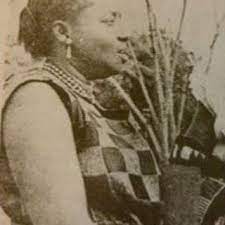By Kelechi Deca.
Sometime last week, I had a debate with a female colleague on the issue of women’s rights in Nigeria. And naturally, that debate dovetailed into the history of women liberation movement in Nigeria, and like most people of my generation, her mind could only conjure images of Margaret Ekpo and Funmilayo Ransome Kuti.
When I brought up the name of Mrs. Janet Mokelu, taken aback, she asked, who was she…tellingly, many (of generations X, Millenials and Z, seem to have an aversion to contemporary history) have never heard of the name Janet Mokelu, but this is the woman who officially contributed far more than any other woman on the issue of women liberation in contemporary Nigeria, especially in the area of political participation.
Janet Nwadiogo Mokelu was a philanthropist, nurse, teacher, headmistress, businesswoman and politician who singularly started the struggle for universal adult suffrage, and made it an official policy of the NCNC.
Yet history books and writers on Nigeria’s contemporary political history say little about this Amazon. Janet Mokelu was the first woman to be ‘truly’ elected into a parliament in Nigeria.
In the 1957 pre-independence Nigeria Mrs. Janet Mokelu was first elected into the Eastern Nigeria House of Assembly, the in 1959 she was appointed into the Eastern House of Chiefs, followed by Mrs. Margaret Ekpo and Ms. Young.
She was the first woman to hold a non gender designated office within the Nigerian political party system. She was the General Secretary of the NCNC Women’s Wing in 1944 and in 1964 the United Progressive Grand Alliance (UPGA) made her their Secretary General.
As Commissioner in the Eastern Nigeria regional government, she fought for and influenced the construction of Onitsha-Owerri road from a ‘track road’ to a fully fledged thoroughfare. As an activist and nationalist, she led the demonstration by women of Eastern Nigeria against the shooting of coal miners at Iva Valley, Enugu by colonial police and soldiers. Defying threats to her own life, her entrance changed the tone of that protest and put it on national and international front burner.
To capture in essence the quality of leadership she brought to the table for the Nigerian woman, Chief Mrs. Magaret Ekpo in 2003 described Janet Mokelu as a political philosopher, an inspiration to women and a motivator whose contributions to the development of law making cannot be quantified.
Ekpo said Mokelu was not just a woman legislator but one who was instrumental to the granting of universal adult suffrage to women. Her words: “At the inception, she was the national secretary of the National Council of Nigerian Citizens (NCNC), women’s wing, while I was the vice-president. Our bond was so strong that people thought that we were blood sisters. She was a great political thinker.”
She believed in equity and pioneered some of the groundbreaking pieces of legislation that turned into history making laws not only in Nigeria but Africa as a whole.
First was the bill demanding that married women be paid same salary as their male counterparts. Before then, it was not the case, men earned higher than women even when they were employed same time for same position.
Another legislation that owes so much to her doggedness was the Right to Vote. She stood her ground and persuaded many of her counterparts on the importance of such liberating legislation. That is so you to truly appreciate the battle a woman like Janet Mokelu fought to ensure that women in Nigeria vote and are voted for which was realised in Eastern and Western Nigeria from 1958.
Our mothers started voting seven years before their counterparts in the United States of America who had to wait until 1965, and even women in Australia waited till 1962. But some countries granted that right to women earlier, like New Zealand (1893) Russia (1917) Germany (1918) Britain (1928) France (1944).
However, Greece with all its political philosophy and claims to being home to modern democracy could not implement Universal Adult Suffrage before India whose womenfolk started voting in 1950. Greek women waited till 1952.
If you are a woman, anytime you queue to vote, or you are paid same wages as your male counterpart in your organisation, remember Janet Nwadiogo Mokelu whose efforts laid the foundation that made it possible.
Kelechi Deca is Editor-in-Chief, The Economy Magazine


